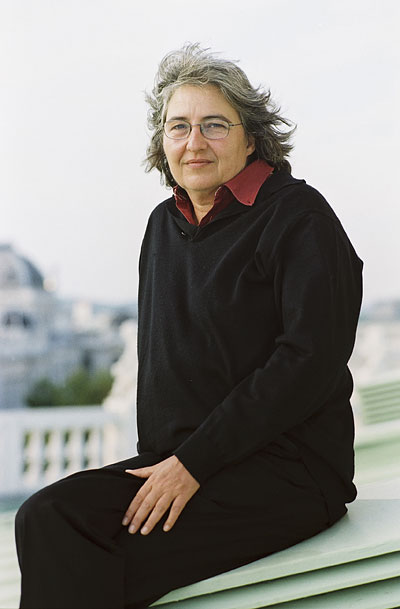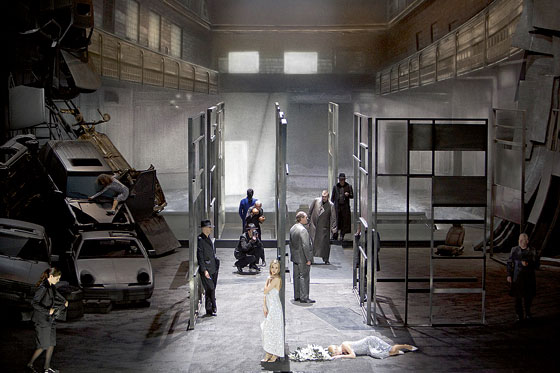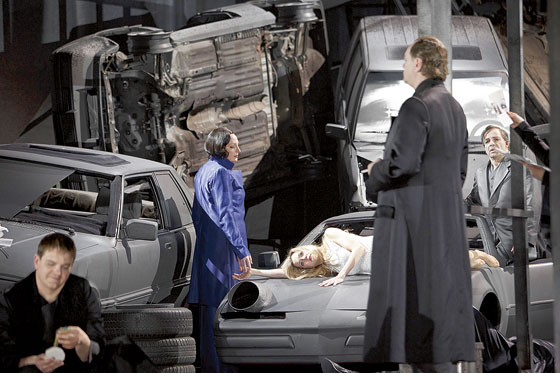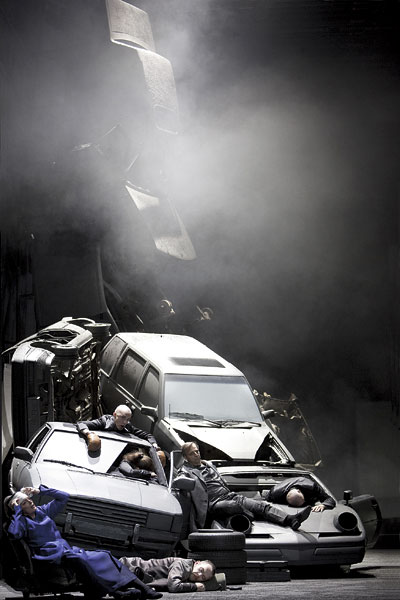|
|
| The elusive Lulu Margarita Zieda, Theatre Critic | |
| In none of the arts can the audience’s craving for blood be felt in such a kind of gladiator arena directness, as in the contemporary opera theatre. At that moment when the last notes have sounded, the curtain has closed and the people who created the evening’s opera performance come out, one after another, to stand before the public. At a premiere of Alban Berg’s opera ‘Lulu’, this season’s latest production at the Berlin State Opera that opened the Easter Festival (Festtage), the stage and the auditorium joined together in a scene worthy of a genuine Easter. The audience cheered for the singers, in a restrained fashion for some, more warmly and loudly for others, then happily and appreciatively hailed the orchestra, which bowed, in this opera theatre not in the orchestra pit but on stage with their musical instruments in their hands, with conductor Daniel Barenboim among them. And then a storm of hostility erupted. As the production’s creative team came onto the stage, a deathly chilling chorus of booing (of a kind that has never been heard at the Latvian National Opera, even on the most unfortunate of evenings,) was ready to wipe these people off the stage with its energetically condemnatory force. The negative evaluation at its most extreme was directed mainly at the director, Andrea Breth. | |
 Andrea Breth. 2012 Photo: Bernd Uhlig | |
| Under her direction, Alban Berg’s opera ‘Wozzeck’ (a scalpel-sharp study of a person’s destruction) produced last season at the Berlin State Opera became the event of the year, greeted with cheers. Breth’s works regularly have been rated among the ten “most not-able productions” at the Theatertreffen Berlin Festival, an evaluation of German-language theatre seasons (in Austria, Switzerland and Germany). Andrea Breth is among the top five directors working in European theatre today. As the storm of hostility grew, conductor Barenboim demonstratively came forwards to the front of the stage, away from the refuge of his orchestra, taking the director by the hand, so as to jointly face the rejection and protest , which was expressed aggressively and for a long time. The nailing on the cross scene, which had been played out in the staging of ‘Lulu’ itself, was now repeated at the conclusion of the premiere, with the audience carrying out reprisals against the artists for the evening. What had happened? ‘Lulu’, a fragment from the hall of mirrors Berg’s ‘Lulu’ – one of the cornerstones of modern opera – has remained unfinished. Only two acts of the composer’s intended three acts of the musical theatre, which was to include an excerpt from silent film, had been written when at the age of fifty Alban Berg passed away from blood poisoning in 1935. Drawing a categorical line denying any comparisons of himself with Mozart, Berg did, however, emphasize the relationship between his work and ‘Don Juan’. Berg was interested in a female version of the phenomenon. Lulu is a mirror image of Don Juan, the model personification of the Eros mythology. Berg’s opera was inspired by two plays by the German playwright Frank Wedekind: ‘Earth Spirit’ and ‘Pandora’s Box’, which at the beginning of the 20th century attracted the intense attention of the public and censors, when sexuality, this extremely powerful part of a person’s nature, became a serious topic of research not only in the texts of psychoanalysts, but also in the theatre. At the centre of both of Wedekind’s plays is the irresistible female force of attraction that is able to drag a man absolutely anywhere, even into death, and in Berg’s opera this happens more than just once or twice. The earth spirit Lulu is a force which resides at irrational levels, where the mind and the will do not rule. Alban Berg perceived Lulu as an element of nature, beyond categories of good and evil, as a power that attracts and destroys, and is at the same time beautiful and unreal, reflecting dreams. Later pragmatic language would define Lulu as a plane of projection on which men’s fantasies are played out. Berg also regards Lulu as an inhabitant of the dream world, composing for her wonderful coloraturas that demand of a performer the highest level of virtuosity and vocal skills. | |
 View from the performance LULU at the Staatsoper Unter den Linden Berlin. 2012 Photo: Vernd Uhlig | |
| Alban Berg’s erotic mystery was devised as mirrored steps. Lulu climbs upwards over men and their dead bodies – pursuing better living conditions, until there is a watershed moment and everything turns the other way, going downwards. Lulu plummets to the bottom, her fall finishing under a bridge in London and under the knife of Jack the Ripper. The composer’s sophisticated symmetrical musical construction causes time to begin to move backwards, starting from the middle of the second act. After the turning point, everything that had been moving upwards is destined to fall down; everything that was loud when moving forwards, has now become quiet on the return. Those same singers who portrayed Lulu’s victims can now be seen as Lulu’s executioners. Attempts at completing the scoring of the unfinished third act have been made many times. This only became possible after the death of Alban Berg’s widow in 1976. Up till then, all ideas of finishing this work were opposed with a categorical “no” from her. The premiere of the completed opera by Friedrich Cerha took place in 1979 in Paris, and was an event of world stature. In recent years contemporaries have turned anew to the orchestration of the third act. In 2010, composer Eberhard Kloke and Norwegian director Stefan Herheim, who is based in Germany, staged ‘Lulu’ at the Royal Danish Opera, having made the musical texture lighter and brighter, whereas when German director Andrea Breth staged this work together with conductor Daniel Barenboim at Easter this year at the Berlin State Opera, it was with different instrumentation again. For the unwritten London scene, where everything is approaching the end and Lulu arrives at the lowest point of her existence, the author of this latest version, composer David Robert Coleman, introduced a number of musical instruments which didn’t exist in the world created by Berg: the banjo, guitar, marimba, cow bells, xylophone, and accordion. It must be said that there was no real debate regarding the question of whether this innovation was in keeping with the style or out of it. Because in the end a completely new version of this opera was developed, not so much by the author of the new orchestration, David Robert Coleman, as by the director Andrea Breth. She radically shortened the musical score, something not even the most experimental or the most provocative directors had ever attempted. The fact that Breth was the one who had dealt with Alban Berg’s ‘Lulu’ in this way was the source of deep and real astonishment for most of the audience, as this artist in particular had for a number of decades become a kind of symbolic figure in theatre practice, in her stand against the massive army of deconstructionists and collagists who had taken over the contemporary stage. She had stood firm, confirming the integrity of the author’s world, and with an ability to reveal old texts in a surprising contemporaneity, not transforming them but revealing the depths of their meaning. The path to a stoic integrity Andrea Breth, whose art’s power and magnificence has always been rooted in her ability to deeply reveal on the stage people in their relationships with themselves, with other people and their era, is almost a lone phenomenon on today’s theatre scene. The great wave of deconstruction in the art of the stage which rolled across Europe, especially in the theatres of German-speaking countries in the 1990s, opened up a space for games with texts, characters and narrative structures, without concern for the integrity of the storylines or the people. With the passing of the wave and with the 21st century entering already its second decade, the consequences are gradually beginning to appear. Directors have become almost identical in face and likeness, but of masters who are able to return to the stage the human being in all his inconsistency and complexity, or a story in all of its multi-layered nature and wholeness, there are almost none. Andrea Breth stands out as a great artist precisely for this type of theatrical storytelling skill. | |
 View from the performance LULU at the Staatsoper Unter den Linden Berlin. 2012 Photo: Vernd Uhlig | |
| Throughout all these times she has worked in a stoic peace, without modifying her style according to the “new parameters”, enduring growing accusations by critics of being “old-fashioned”, and continuing to create theatre in the way that she herself considers to be right. Behind this stoicism she has journeyed alongthe path of experimentation, which began after a major artistic failure with the staging of a classic, Gotthold Ephraim Lessing’s bourgeois tragedy ‘Emilia Galotti’. After this, the director’s fatherhad taken his daughter to Italy for a holiday, where he’d had some sobering words to say: “Now you’ve tried everything in your life, please start doing something that you know how to do.” That was 1980, a time when Breth had become a rising star. Her earlier work had been very highly praised in the press, her successes coming one after the other, and the young director was receiving serious invitations from drama theatres and opera houses. “When an artist is very young, a real danger exists that she’ll go and believe all of the public praise and friendly pats on the shoulder and at some moment really starts believing that she’s Mozart! And then soon enough your questioning of yourself ends,” comments the director, speaking from today’s perspective, in Irene Bazinger’s ‘Frei für den Moment’ (‘Open to the Moment’) book of interviews, saying that after the defeat in her work with the great classics she refused all of these wonderful offers without exception, because she understood that she had not mastered her trade. And so she left the theatre. After a time, by starting to work with students, Andrea Breth gradually re-engaged with her profession, developing performances without the use of previously prepared dramaturgical material, from text motifs and through actor improvisation. In her experimental theatre works in Freiburg, the director incorporated her latest explorations in the visual arts, placing particular emphasis on the dialogue of video and theatre language, until one day the theatre’s artistic director confronted her with a severe question: is this some kind of documenta or is it the theatre? The director accepted this question as a compliment, although as far as the theatre director was concerned it was meant to be criticism leading to constructive reflection. This is the time that Breth completely transformed her theatre visuals, developing a new kind of visuality in her works and using the best of cinematic storytelling techniques in her works. Interest in the visual arts also accompanied Andrea Breth on her further path. In 2005, at the Ruhr Triennale, together with the artist Christian Boltanski she created the Nächte unter Tage (‘Day and Night’) performance, scattered in space and images at one of the most impressive industrial monuments – the Essen coal mines – and dedicated to the people who had spent their lives in the dark. The performance was created as a poetic expedition through forgotten spaces – coal mining shafts, tunnels and labyrinths, with the director interested in the unspoken and the unlived that lies within a person. Meanwhile Boltanski transformed people’s unexpressed fears and impressions from their memories into spatial installations: “The doors finally open and you are back in life, where there’s light.” Having analysed the various ways of speaking to people in the theatre, Breth returned to the great classics, to the most difficult challenge for a theatre director, with an unshakable conviction, and with the determination of trying to read these texts on the stage together with contemporary people – actors. The essence of ‘Lulu’ The director herself considers Alban Berg’s opera ‘Lulu’ to be the most complex task that she’s ever had to solve, both artistically as well as intellectually. And, in working on this piece, she changed her powerful and convincing theatrical approach – that of revealing a work in its entirety – for a completely different one, launching into a risk zone new to herself. This isn’t Andrea Breth’s first opera production. The director already has productions of Gluck’s ‘Orpheus’, Smetana’s ‘The Bartered Bride’, Bizet’s ‘Carmen’, Tchaikovsky’s ‘Eugene Onegin’ and Berg’s ‘Wozzeck’ to her name. Her view is that in opera, stories must be told in a principally different way than in drama theatre, so that the viewer isn’t forced to ask why the people on stage are singing instead of talking. Breth compares the creation of an opera performance with painting. “It’s a very particular art form, and it’s my art form, which is extraordinarily powerfully supported by great music. Whatever the complexity of Alban Berg’s music, I have to think up something that also becomes visible on stage, not just audible,” thus Breth revealed her chosen approach to the Frankfurter Allgemeine Zeitung newspaper on the day of the premiere. Usually ‘Lulu’ is produced by male directors, and from a male viewpoint. In recent theatre history there has been one attempt to present ‘Lulu’ from a female perspective. This took place a number of years ago in drama theatre – at Berlin’s Schaubühne am Lehniner Platz. In his production of ‘Lulu’, director Volker Lösch gathered together real Berlin prostitutes on stage and included their observations and views on men, obtained through their work experience, in the text. ‘Lulu’ continues to be associated with an erotically charged world, permeated by sensuality, where the drive towards death takes place with an irrepressible power, opening the space of the stage to a banquet of erotica. | |
 View from the performance LULU at the Staatsoper Unter den Linden Berlin. 2012 Photo: Vernd Uhlig | |
| Director Andrea Breth, together with scenographer Erich Wonder, set the erotic mystery in an old car dump, a black hole in which cars are crushed together, frozen in their downward tumble. Some have already fallen into the hole, some can be seen in flight, with some only about to fall. Carefully listening to Berg’s opera, Breth has heard only a single message. It is a brutal, hopeless gender war, which keeps on going around in circles, again and again going through all the arches of hell. And as such it is announced right at the very beginning of the performance, with the director starting the story from the end. Already at the very beginning Jack the Ripper is carrying draped over his shoulder a woman in a glittering dress. She will be nailed to the cross. The Lulu as played by singer Mojca Erdmann is not a vamp that drags men to destruction, nor a siren singing them to their death, but a delicate, gentle creature, one who is destroyed. This agonizing image is repeated and varied for the next three hours like an optic mantra, doubling and tripling. The living dead move around the stage, carrying helpless creatures over their shoulders. The zombies are the previous drivers of the cars, macho beings, who brutally exploit Lulu and then kill her. Declining the revelation of a person’s multidimensionality in the process, which is the great strength of Breth’s art, the director has created a theatrical installation with just the one apocalyptic message. Alban Berg’s opera sounds through this theatrical installation, without changing into dialogue, without developing through processes, but reproducing the same image again and again. The view of the male remains unchanged: he has died and been resurrected, only to be killed again. It’s not surprising that the only ones booing at the end were men, and men only. At the end of the performance, the glittering image of Lulu is drenched in petrol and burnt. In her stage reading, Andrea Breth has concentrated on the transmission of the essence of the content of Berg’s opera, in the way that she has read and perceived it. This has led to Breth’s radical cutting path: the excision of Berg’s prologue of the opera, even the abandonment of a whole scene in the work, ignoring the fact that the author himself had developed the opera’s composition in strict symmetry. Other minor segments are also shortened so that the viewer’s attention doesn’t stray from the important statement. But in a medium that is so wasteful of time as is the opera, choosing to create a stage installation with a message that is obvious already in the first few minutes of the performance, and which remains unchanging, means going down a losing path. Work with scissors, as Andrea Breth once again demonstrates – paradoxically with her own work this time – makes the dialogue poorer, not richer. And we can only wave our hands about helplessly: there is so much to be reflected upon about the powerful existence of Lulu the earth spirit in a person’s life, had but the director had remained faithful to herself when presenting Alban Berg’s ‘Lulu’ on the stage! The second half of this article was meant to be a description of what would have been possible, if the artist had remained true to herself. It would have been dedicated to the performance of Zwischenfälle (‘Episodes’) directed by Andrea Breth at Vienna’s Burgtheatre, and based on motifs from works by Russia’s absurdist genius Daniil Kharms and two French masters of farce – Georges Courteline and Pierre Henri Cami. Breth’s absurdist view on the world, in which ten outstanding Vienna Burgtheatre actors perform ninety roles, with its healthy, eccentric zest for life, received Austria’s most important professional prize this season, the Nestroy Award, as the best directed work in Austria this year. This is a performance which is absolutely adored by audiences and theatre professionals, and which, in an outstanding way, continues along the new humanist path cultivated by contemporary theatre artists, sweeping viewers along with them. Unfortunately the flight to Vienna didn’t materialize for financial reasons. All that remains is to recommend that if you happen to be in Vienna, by all means, don’t miss this vital event in the life of the theatre, Andrea Breth’s ‘Episodes’! This is theatre that opens the eyes, head, heart and mind, enabling one to return to real life with a fresh outlook. /Translator into English: Uldis Brūns/ | |
| go back | |







